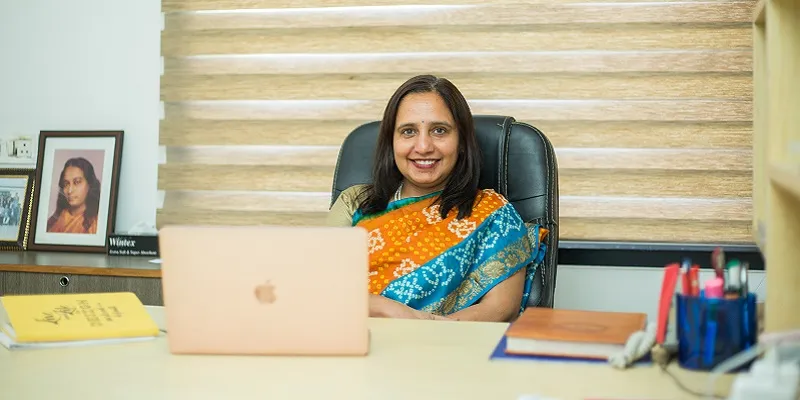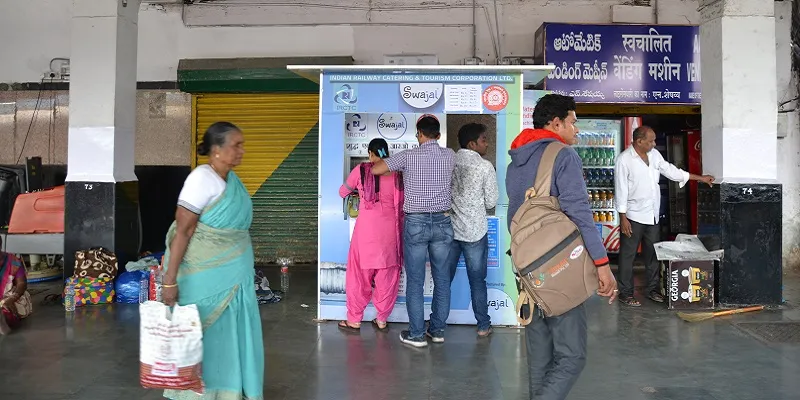Swajal wants to solve the drinking water problem with innovation-driven vending machines
On World Water Day, we take a closer look at Swajal Water, an IoT-enabled water purification solutions provider that has helped over 2 lakh people across 9 states in India.

With 63.4 million rural people lacking access to clean drinking water, India tops the chart of world’s worst countries for rural water access. According to a study conducted by India’s official Ground Water Resources Assessment, over one-sixth of the country’s water groundwater supply is either overused or exploited. With many mega cities like Bengaluru being listed among the next big metropolises to go without water, the water crisis in India has not spared urban landscapes either.
Even as repeated droughts, mindless urbanisation, and water draining agricultural practices continue to increase the strain on limited water resources in India, startups like Swajal, which are coupling cutting-edge technology with solar energy, are showing the way in setting up successful models to purify and provide drinking water at affordable rates.
Founded by Dr Vibha Tripathi in 2014, Swajal offers mineralised, purified water with ultra-filtration and reverse osmosis (RO) for as low as 50 paise per litre.
The beginning
Having been born in a small village, Dr Vibha always desired to work in the developmental sector to benefit people in rural India. Recalling her journey, she explains what forced her to ditch a flourishing research career in IIT Kanpur to walk the entrepreneurial path.
“It was indeed a drastic decision to resign from my position as a research engineer. But I was scared I was losing sight of my larger goal and that is what made me quit,” says Dr Vibha, who started Saurya EnerTech in 2008.
Equipped with a doctorate in physics and natural sciences, Dr Vibha began by exploring and innovating in the field of solar energy.
Even as I touring various villages to devise solar-related solutions, I observed how the problem of drinking water could be solved through an energy-water nexus, she shares.
“Data reveals that the water quality in many rural areas is worse than imagined. Many children were suffering without access to clean drinking water. We need to tackle this issue on a war footing basis. Apart from building adequate infrastructure, we should also concentrate on water harvesting methods to address it in the long run, she says. Dr Vibha spun off Swajal from her earlier startup Saurya in 2014. She is the Founder and Managing Director of Swajal Water.
Installing the water machines
Encouraged by a team of environmentalists, social workers, serial entrepreneurs, authors, and scientists, who drive the company as co-founding members, Swajal Water started by deploying water purification systems across government schools, railway stations, industrial plants, and residential areas in urban and rural geographies.
We have two revenue generation models in the form of sale of water purification machines and sale of purified water in itself. While many Swajal machines are installed at schools, stations, and pilgrimage centres to benefit floating populations (where water is sold at Rs 1 per 350 ml glass), our subsidised machines also sell water in the villages for prices as cheap as 50 paise per litre, she explains.

Explaining about the acquisition of water, she adds: “It depends upon the area. Mostly the water is derived from the water table (ponds, rivers, wells etc.) using solar energy. It is then purified and dispensed using our sturdy, fully automatic water ATMs that have a nine-stage cleaning process”.
Having raised an initial investment of $1.2 million in 2015, Swajal Water has installed around 30 machines in various government schools, 40 machines at railway stations, and 20 more machines in Delhi’s Sarojini Nagar.
The taste of sweet water
The much acclaimed and awarded company has also been supported and felicitated by multiple domain leaders like UNDP, Goldman Sachs, FICCI, and the Ministry of New and Renewable Energy for creatively addressing health concerns relating to contaminated water.
To test the first model in a pilot project, Swajal installed two 5,000-litre per day purifiers in the Chandankhera and Karimabad villages of Uttar Pradesh, which have high fluoride content in their groundwater. However, even after the initial success of several pilots, “the journey of Swajal has been a bumpy one all along”, says Dr Vibha.
Having a great idea is not enough to be an entrepreneur; you need to be strong and enthusiastic to turn it into a business. Since I did not have any prior experience in handling finances, people or multi-tasking, I had to learn along the way – be it developing a prototype to getting people to adopt your idea seriously, she adds.
However, it’s the sight of people queuing up in front of Swajal machines to fetch clean drinking water that keeps Dr Vibha inspired to do better. Recalling the most innocent and heartening compliment she ever heard, she says, “In a village in Unnao district, a few women came up and asked us to open our purification machines and show us where the sugar sacks were kept. They had almost forgotten what sweet drinking water tasted like.”
The way ahead
Today, Swajal Water is operational in nine states across India with its machines being sold and installed even in the remotest corners of Madhya Pradesh and Rajasthan. “We have fitted over 300 machines (with a capacity to dispense 100-1000 litres of water per hour) in various cities and villages,” Dr Vibha says.

“These machines, operating on the Build-Own-Operate-Transfer (BOOT) model, are regularly serviced and maintained. Since they run on IoT and cloud technology, they can provide great visibility of deployments and an effective after-sales service, including data on the amount of water dispensed, money collected, and even the health of the machine,” she adds.
Swajal’s franchise-driven model also promotes local entrepreneurship and allows locally-generated revenues to be absorbed by the local economy.
Our environment-friendly business model has enabled us to aid in point-of-use water conservation and create livelihoods for over 200 people along the way, she shares.
Swajal’s R&D initiatives are also constantly striving to further diversify its solutions and product offerings from RFID-based water purification systems and large drinking water plants with tracked water bottles.
Having already impacted 2 lakh people across India, the enterprising physician is also keen on taking the current figure of 300 machines to 1,000 deployments and touch a million lives by end of this year.
“Though we are ambitious to scale up rigorously, we acknowledge that fundraising can be a constant issue. However, we are surely going to expand to new regions and new states in India in the coming days,” Dr Vibha concludes optimistically.







